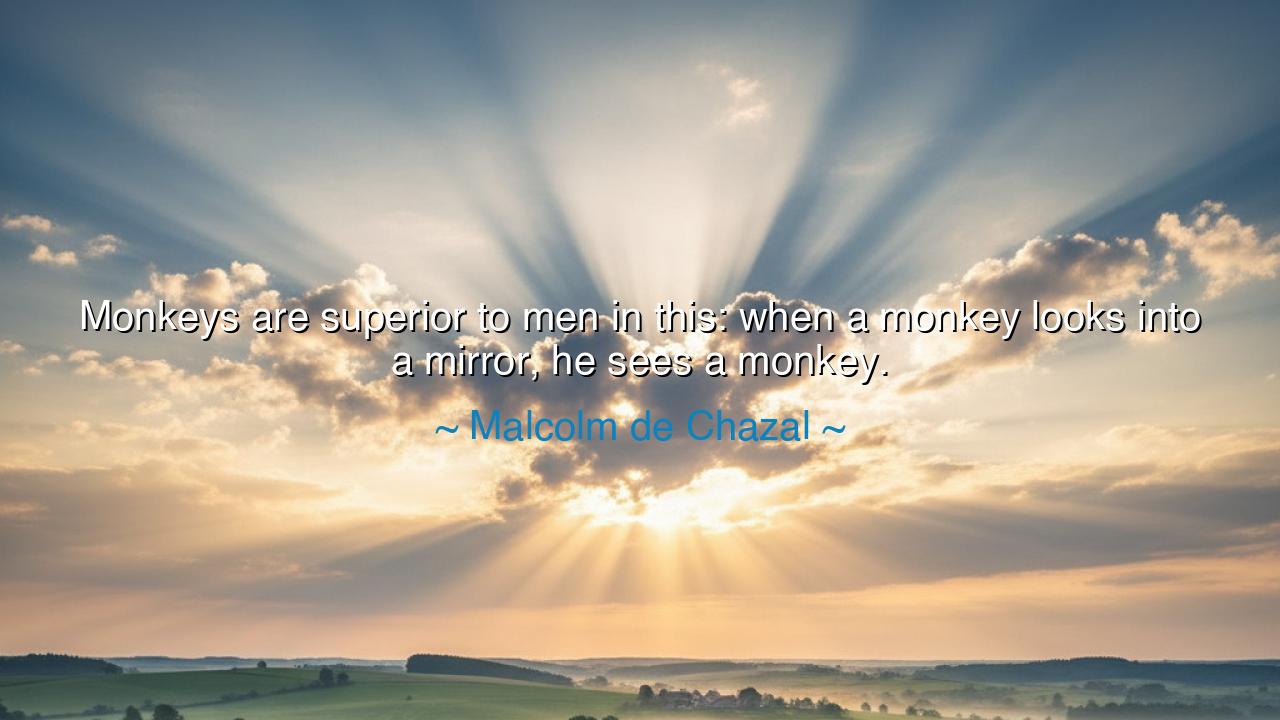
Monkeys are superior to men in this: when a monkey looks into a
Monkeys are superior to men in this: when a monkey looks into a mirror, he sees a monkey.






Listen, O children of wisdom, to the words of Malcolm de Chazal, whose insight into the nature of self-awareness and human vanity cuts deeply into the heart of human pride. He spoke thus: "Monkeys are superior to men in this: when a monkey looks into a mirror, he sees a monkey." These words are more than a simple reflection on the nature of animals and humans; they are a profound commentary on the illusion of self-perception that so often blinds us to our true nature. The monkey, in all its simplicity, sees itself clearly, while man, in his complexity, often fails to see himself as he truly is.
At the core of Chazal's statement lies the idea that self-awareness is a double-edged sword. The monkey, with its straightforward nature, sees in the mirror only what it is: a monkey. It is unclouded by the complexities of self-identity, untroubled by the need to be more than what it is. But man, with his greater capacity for reflection, often finds himself staring into the mirror and seeing not what he truly is, but what he wishes to be or fears he has become. He fills the reflection with his desires, his ambitions, and his insecurities, never quite able to see the truth of his own nature without distortion.
This idea is deeply rooted in the ancient teachings of self-knowledge. Socrates, the great philosopher, famously declared, "Know thyself." For Socrates, the key to wisdom lay not in the accumulation of knowledge but in the understanding of one's own nature. Yet, as Chazal implies, this quest for self-knowledge is fraught with danger. Man’s ability to reflect on himself can be both a blessing and a curse. We may gaze into the mirror and see a reflection clouded by falsehoods, creating an image of ourselves that is either too grand or too diminished, distorted by the very nature of our minds.
Consider the ancient story of Narcissus, the Greek youth who fell in love with his own reflection in a pool of water. Narcissus was entranced by his own image, seeing in the reflection not the reality of who he was, but the idealized version of himself. Blinded by vanity, he became consumed by his image and, tragically, lost himself in the process. This myth, like Chazal’s words, warns us of the dangers of becoming too enamored with our own reflection, of seeing ourselves not as we truly are, but as we wish to be. The mirror of self-perception can become a prison when we mistake it for the truth.
In contrast, the monkey’s simplicity serves as a powerful reminder of the clarity that comes with being unburdened by self-deception. The monkey looks into the mirror and accepts its reflection with ease, for it has no desire to be anything other than what it is. It is not filled with ambitions or doubts, but simply exists in harmony with its nature. In this way, the monkey is superior to man, for its understanding of itself is pure, untainted by the fears and desires that cloud human judgment. True wisdom, Chazal suggests, lies in seeing oneself without illusion, accepting one's strengths and flaws with the same clarity that the monkey accepts its own nature.
The lesson here, O children, is one of truth and humility. Let us strive to see ourselves as we truly are, not through the distorting lens of our egos, our desires, or our fears, but with the simplicity and clarity of the monkey’s gaze. In our reflections, let us not seek to embellish ourselves with false grandeur, nor diminish ourselves with undue shame. Instead, let us approach the mirror with honesty, understanding that to know oneself is not to be perfect, but to accept one’s humanity with all its complexities. It is only through this honest self-awareness that we can truly grow and become the best versions of ourselves.
And so, O children, take this wisdom into your lives. Do not be deceived by the illusions you create about yourselves, but strive to understand who you are in truth. In every moment of reflection, ask yourself: "What is the truth of this image?" And in doing so, may you find the peace that comes from true self-knowledge, unclouded by vanity or fear, and learn to embrace your true nature with grace and humility. For in this acceptance, we find the strength to grow, to evolve, and to live with purpose and authenticity.






AAdministratorAdministrator
Welcome, honored guests. Please leave a comment, we will respond soon